One experience that most newly arrived foreigners in China have in common, is wondering what all the KTV signs represent. These signs can be seen in quantity in any city in China.
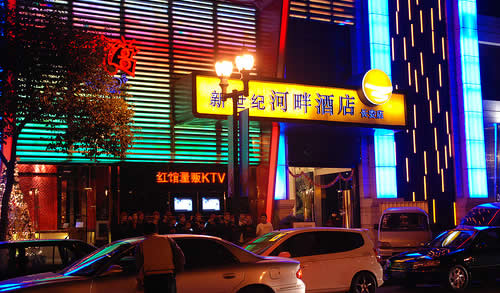
Image Source: Alec @ Taiwan (License)
KTV stands for Karaoke Television (or video karaoke) and the signs indicate the location of KTV Hotels where the Chinese hire small sound proof rooms and sing the night away. It is an extremely popular pastime in China.
There are approximately 100,000 KTV establishments in China. They range from huge stand alone hotels down to small single room establishments.
Why Is KTV So Popular?
Another question that’s commonly asked by foreigners is why is KTV so popular in China? There are some Westerners who get into KTV, but the majority just don’t understand why it’s so popular.
It seems to be a cultural thing, which extends to other Asian cultures, as it’s popular in most Asian countries. Exactly why this is the case (and why it’s never really taken hold in the West) is anyone’s guess. However, I’ve noticed a couple of things about the Chinese and karaoke:
- Most Chinese are pretty good singers. Of course, some are better than others (and some are awful), but in general the average Chinese person sings better than the average Westerner. I think this because Chinese is a tonal language. The biggest difficulty that Westerners who learn Chinese face is distinguishing between the tones.
- The Chinese are very polite when listening to someone who really can’t sing. They’ll applaud enthusiastically. There won’t be any jeering. This may be related to the concept of face, but I think it goes beyond that – I think the Chinese really appreciate someone having a go.
These are just my opinions. If the truth be known, I’ve only very rarely ‘played KTV’ (as the Chinese would say).
The KTV Room
The typical KTV room is maybe the size of a lounge room, with a big couch for people to relax on, a long coffee table for snacks and drinks and of course some karaoke equipment.
The karaoke equipment is made up of the karaoke machine itself (a console where you select the songs), the TV screen and some karaoke microphones. I guess there may be more equipment that you can’t see, to store the videos.
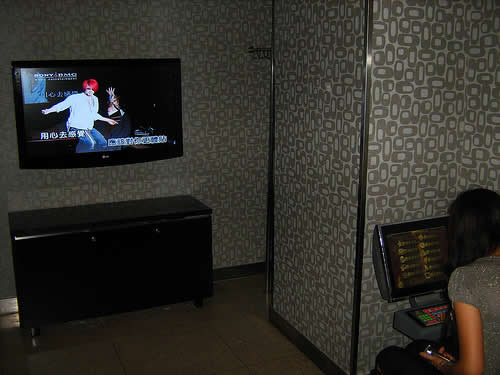
Image Source: ..AikiDude.. (License)
It’s normally fairly dark and people sit around taking turns to sing, while enjoying snacks and drinks. Sometimes there are drinking games (Chinese drinking games are a fascinating, but different story), but mostly it’s just singing and relaxing.
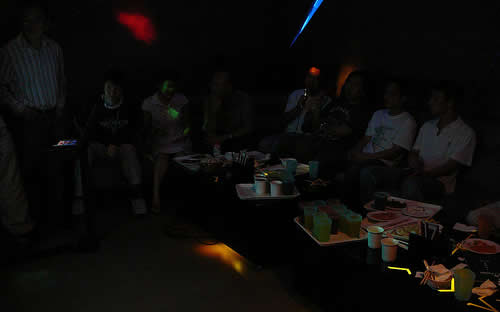
Image Source: Silly Rabbit, Trix are for Kids (License)
Afterwards, there’s almost always a mess (often you can’t see the floor for sunflower seed shells!).
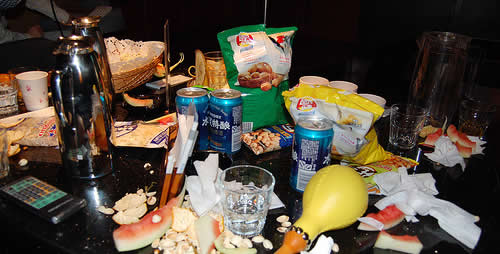
Image Source: MK Media Productions (License)
Karaoke Music
So what do people sing when they ‘play KTV’? Of course, there’s a lot of Chinese pop music and some traditional Chinese ‘folk’ songs, but there’s also a lot of Western music.
The cross section of Western music is quite wide (and somewhat peculiar). You’re unlikely to find the very latest releases, but there are a lot of pop songs: Celine Dion, Witney Houston, West Life, etc. And of course the B52’s:
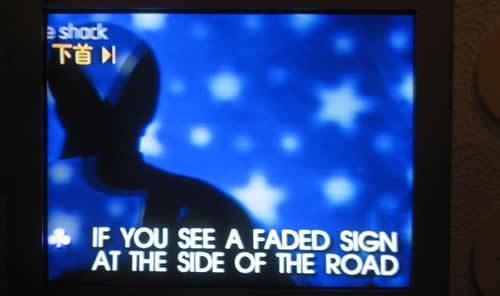
Image Source: Sam Ose / Olai Skjaervoy (License)
Some of the songs are really old and have passed their used by date in the West. For example, despite their songs being from my childhood, The Carpenters are very popular. Now that’s something I really don’t understand! 🙂
In one visit to KTV, the best song I could find was House of the Rising Sun, another very old song, but somewhat cooler than the Carpenters.
The KTV videos are sometimes quite strange. Many are shot just for Karaoke and don’t seem to have any relation to the actual song. For example, you’ll see footage of people windsailing in Australia, while a Chinese pop song plays. Bizarre, but it adds to the experience!
Now, the award for the most bizarre:
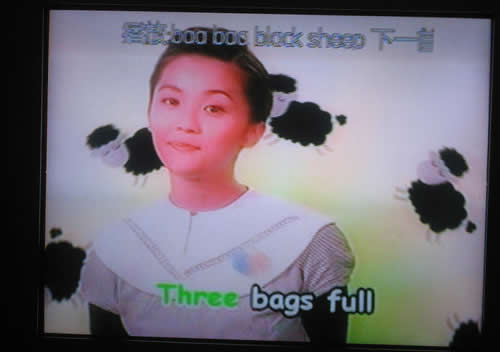
Image Source: Sam Ose / Olai Skjaervoy (License)
Yes, that’s Baa Baa Black Sheep, with sheep on the wall and a Chinese actress dressed up as, well I’m not sure what!
Royalties
On a serious note, there has been a storm over royalties in recent years.
Karaoke videos are used in approximately 100,000 KTV parlours across the country and very few of these pay royalties. Of course, most of the establishments will be using pirated Karaoke DVDs in the first place!
In November 2006, a National Copyright Administration notice was issued, requiring that Karaoke operators pay a daily fee of up to 12 yuan for each room, with the fee varying from region to region. According to the People’s Daily:
The royalty in Beijing was set at 11 yuan at the beginning of this year, the second highest in the country compared with the highest 11.1 yuan in Shanghai and the lowest 8.1 yuan in northwestern Gansu Province.
However, there has been resistance to this move:
At present, only about 10 operators out of more than 1,000 Beijing-based karaoke bars paid royalties for the copyrighted audio-video products they used. The figure stood at about 1,000 nationwide, according to the association.
That translates to only 1% of Karaoke establishments paying the royalty fee. Interestingly, the percentage is 1% both in Beijing and throughout China.
As a result, the China Audio-video Copyright Association (CAVCA) has started suing people, starting with 100 KTV operators in Beijing. However, that’s only 10% of KTV establishments in Beijing, meaning that 89% have neither paid or faced legal action.
There’s a long way to go before Beijing is cleaned up, let alone the rest of the country. This issue won’t be going away anytime soon.
The Seedy Side Of KTV
It’s well known that there’s a seedy side to KTV in China. A search for "KTV in China" results mostly in sites discussing the blurred lines between KTV and ‘escort services’ where young women are available for a fee.
For example, one of the top search results is a forum topic on Chinese Savvy discussing sleazy KTV hotels. One poster says:
So, I’ve come to realize there are two types of KTV’s in Beijing: the type you bring your girlfriend to, and the type you don’t.
I know many girls who go to KTV’s with their friends, don’t drink and sing all night. Then I know the guys who go to KTV’s, drink, sing half the time and spend the rest of it talking to a hired girl. And I’m sure additional ‘services’ are available at a cost.
Even Wikipedia’s page on Karaoke Box has a section on Special KTV.
A group of gentlemen patronizing a KTV in China will typically have a group of young women brought into the room from which each man may choose his personal hostess. In Taiwan, these establishments are known as a Special KTV. This "hosting" can range from polite conversation to sexual liaison, depending on the policies and niche of the particular "special KTV" lounge. Sexual recreation can take place in the KTV room itself, a "love hotel", or at the residence of the client.
Although the Wikipedia article is mostly centered on Taiwan, it mentions that it’s the same in mainland:
These Special KTVs are also prevalent in Mainland China, although they are known simply as ‘KTV’. As in Taiwan, the additional services available from the hostesses are officially illegal for sale, though the local police force has very little interest in enforcement of this. KTV establishments in the larger, more prosperous cities in mainland China can be quite large and extremely opulently decorated. Some are detached, multistory buildings employing several hundred staff.
I’ve never been to a ‘Special’ KTV establishment, but I do know an foreigner living in China who paid a KTV girl to quit her job and become his live-in girlfriend instead.
However, despite the amount of press the ‘Special’ KTV hotels get, the vast majority of KTV activities in China are just innocent fun.
Final Thoughts
Love it or hate it, KTV is a big part of entertainment in China. If you ever live in China, you’ll surely be dragged along to KTV at some point. Try to relax and enjoy the experience!
Why would you ever go the KTV that does not provide girls?
Thank you for sharing that fantastic track!
the only reason there are so many KTV’s is because of the “seedy” part ..